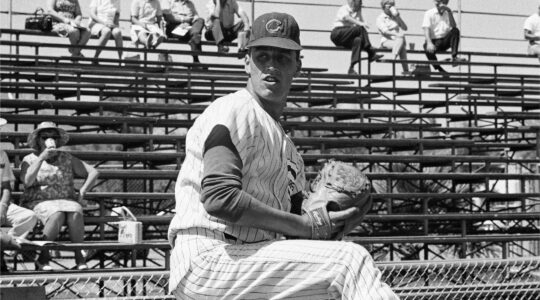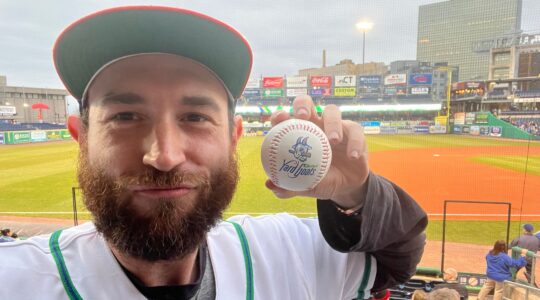
Ike Davis on overcoming his hitting woes: “You’ve just got to put your head down and grind.” (Hillel Kuttler)
BALTIMORE (JTA) — Ike Davis was upbeat despite the rain pelting the Camden Yards turf and his struggles at the plate.
The new Pittsburgh Pirates first baseman was playing catch with teammate Josh Harrison when music from the loudspeakers sent him into a dancing whir. Harrison couldn’t stop giggling.
But Davis’ hitting problems with the New York Mets were no laughing matter. His mid-April trade was offering a fresh start with a Pirates team coming off a 2013 playoff appearance.
The move to Pittsburgh has been “a really good transition” because “I’m obviously getting playing time,” Davis said in the Pirates’ locker room here before the game was rained out.
His new teammates say Davis introduced himself to everyone, indicating a desire to fit in.
“He’s a very upbeat guy, always positive, always optimistic,” second baseman Neil Walker said.
“I’m just glad we got him,” said Jeff Banister, a Pirates coach. “He’s a left-handed power hitter who has the ability to hit the ball the other way and is a terrific defender at first base.”
Davis said the experience of being traded from New York, an organization to which he’d belonged since 2008, “was weird,” but “not as devastating as you would think.”
One familiar face on the Pirates is center fielder Andrew McCutchen, the National League’s Most Valuable Player last year. As 17-year-olds, the two played together on a U.S. junior team at a tournament in Taiwan.
“He was no different than he is now,” McCutchen said of Davis circa 2004. “Baseball is a crazy game; you never know who you’re going to play with [again].”
Davis, 27, had enjoyed a sterling rookie season in 2010 (19 home runs and 71 runs batted in), a solid but injury-shortened 2011 (.302 batting average) and a productive 2012 (32 HRs and 90 RBIs, despite a .227 average) before falling to .205 last year and being demoted to the minors.
The Mets sought to trade him last winter, and he played sparingly before being dealt.
Davis is among about 10 Jewish major leaguers; former Mets teammate Josh Satin is another.
Pittsburgh’s Jewish community hasn’t yet reached out to Davis, but he said he appreciated the support of Mets fans.
“I guess it’s nice to see a guy with Jewish blood playing professional sports,” the lanky infielder said.
In New York, Davis said he received scores of invitations to bar mitzvahs and weddings that he did not attend because he didn’t know the celebrants.
He quickly adapted to Pittsburgh, doubling in his first at-bat and belting a grand slam in his third game. The latter set an odd major league record, since Davis had blasted a grand slam for the Mets earlier in April – a pinch-hit, game-winning homer, at that. Both came against the Cincinnati Reds.
“It’s an interesting trivia-game fact. It was just nice to hit the ball over the fence,” he said with a laugh.
“I hadn’t had a lot of great moments in the last year-and-a-half in New York because I hadn’t played well, so it was nice to do something positive,” Davis said of the April 4 game-winner.
Davis wouldn’t lay his struggles on health issues, including a 2011 ankle injury, a bout with Valley fever in 2012 and an oblique strain last year.
“Obviously, I could blame a lot of things, but to tell you the truth, I don’t like to do that, just because I’m out there with the bat and it really doesn’t matter if something hurts or I’m sick. You still have to put the bat on the ball,” he said.
“You’ve just got to put your head down and grind and not [apply] pressure when you’re not going well because that’s what I’ve done in the past, and I’ve made [a slump] last longer than it should have.”
While playing for the Mets, Davis attended a 2010 gathering at the team’s Citi Field with families of Holocaust survivors. Working on a high school project in his hometown of Scottsdale, Ariz., he had discovered that many of his mother’s relatives in Lithuania were Holocaust victims.
“Being able to sit there and talk with family members of Holocaust [victims] was pretty cool,” he said of the stadium meeting. “You got to hear some stories about how it affected family trees and how many people were terminated during the Holocaust.
“I think it’s good to talk about it because the more you talk about it and learn history, hopefully you don’t make the same mistakes in the future.”
Davis hasn’t been to Israel and doesn’t rule out playing for an Israeli entry in the World Baseball Classic (the next qualifiers will be in 2016), but said he dreams of representing an American team there.
The here and now is challenge enough. Davis slumped following his initial successes with his new team, at one point going hitless in 21 at-bats. But this week he had several hits against the National League West-leading San Francisco Giants, including three in one game, along with some hard-hit outs.
As of May 7, Davis had raised his average to .237, helping the Pirates move out of last place in the N.L. Central into fourth, 7 1/2 games behind first-place Milwaukee.
Later this month, Davis will return to New York when the Pirates play the Yankees — one of the teams for which his father, former reliever Ron Davis, pitched — and the Mets.
“I wouldn’t take it back, that’s for sure,” he said about playing in the Big Apple. “I made some lifetime friendships. I got to experience living in one of the biggest cities in the world. I definitely enjoyed my time there.”





